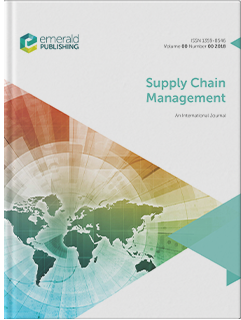克服粮食回收的障碍
IF 7.9
3区 管理学
Q1 BUSINESS
Supply Chain Management: An International Journal
Pub Date : 2024-02-14
DOI:10.1108/scm-03-2023-0132
引用次数: 0
摘要
目的对食物损耗和浪费(FLW)的研究和关注日益增多,但阻碍企业参与食物回收工作的障碍也随之增加。本研究的目的是更好地了解企业如何克服这些障碍。本研究采用了基于实地考察的定性研究设计,对 23 家食品企业的决策者进行了访谈。研究结果所形成的概念模型有助于从以下几个方面解释与 FLW 相关的决策:食品回收的障碍、克服障碍的激励机制、参与食品回收的内部流程以及影响内部激励机制和流程的外部关系。此外,还将障碍和激励因素分为运营问题和管理问题。原创性/价值在先前研究的粮食回收障碍的基础上,我们探索了帮助企业克服这些障碍的流程。本研究建立的模型是朝着解决这些过程和关系迈出的重要一步。它可以作为今后对食品回收进行各种研究的基础。本文章由计算机程序翻译,如有差异,请以英文原文为准。
Overcoming the barriers to food recovery
Purpose
Research and interest in food loss and waste (FLW) have increased, but barriers stand in the way of firms engaging in food recovery efforts. The purpose of this study is to gain a better understanding of how firms overcome these barriers.
Design/methodology/approach
This study followed a qualitative, field-study-based research design in which 23 decision-makers at food-based organizations were interviewed. Quotes were extracted and categorized to develop a conceptual model of the food recovery process.
Findings
The conceptual model that evolved helps to explain decision-making related to FLW across the following dimensions: barriers to food recovery, incentives to overcome the barriers, internal processes for engaging in food recovery and external relationships influencing internal incentives and processes. In addition, the barriers and incentives were divided into operational and managerial issues.
Originality/value
Building on the barriers to food recovery in prior research, we explored the processes that help firms overcome these barriers. The model developed in this study is an important step toward addressing these processes and relationships. It can serve as a foundation for a variety of future studies of food recovery.
求助全文
通过发布文献求助,成功后即可免费获取论文全文。
去求助
来源期刊
CiteScore
16.70
自引率
5.70%
发文量
27
期刊介绍:
Supply Chain Management (SCM) is a journal that places great emphasis on research findings with international relevance and global impact, benefitting both theory and practice. To be considered for publication, research papers and case studies submitted to SCM must contribute to extending supply chain knowledge beyond a dyadic perspective.
The journal focuses specifically on empirical research and does not accept submissions related to modelling or simulation. This is because the challenges posed by globalization and rapidly evolving technology trends have a direct impact on supply chain design and management. Therefore, it is essential for contemporary supply chain practices to be responsive, proactive, integrated, and driven by information when managing the various components of the supply chain.

 求助内容:
求助内容: 应助结果提醒方式:
应助结果提醒方式:


